-
 Bitcoin
Bitcoin $113900
-1.39% -
 Ethereum
Ethereum $3517
-4.15% -
 XRP
XRP $3.009
1.59% -
 Tether USDt
Tether USDt $0.9997
-0.04% -
 BNB
BNB $766.8
-1.41% -
 Solana
Solana $164.6
-2.38% -
 USDC
USDC $0.9998
-0.02% -
 TRON
TRON $0.3277
0.65% -
 Dogecoin
Dogecoin $0.2023
-1.67% -
 Cardano
Cardano $0.7246
0.05% -
 Hyperliquid
Hyperliquid $38.27
-4.77% -
 Sui
Sui $3.528
-0.52% -
 Stellar
Stellar $0.3890
-0.73% -
 Chainlink
Chainlink $16.16
-2.69% -
 Bitcoin Cash
Bitcoin Cash $539.9
-4.38% -
 Hedera
Hedera $0.2425
-2.00% -
 Avalanche
Avalanche $21.71
-0.97% -
 Toncoin
Toncoin $3.662
5.73% -
 Ethena USDe
Ethena USDe $1.000
-0.02% -
 UNUS SED LEO
UNUS SED LEO $8.964
0.35% -
 Litecoin
Litecoin $107.7
2.33% -
 Shiba Inu
Shiba Inu $0.00001223
-0.40% -
 Polkadot
Polkadot $3.617
-0.97% -
 Uniswap
Uniswap $9.052
-2.49% -
 Monero
Monero $295.1
-3.79% -
 Dai
Dai $0.9999
0.00% -
 Bitget Token
Bitget Token $4.315
-1.85% -
 Pepe
Pepe $0.00001060
0.11% -
 Cronos
Cronos $0.1342
-2.72% -
 Aave
Aave $256.0
-0.87%
Digital Gold Terminology: A Must-have Jargon Manual for Bitcoin Investors
Bitcoin, often called digital gold, relies on blockchain technology and is secured through mining and proof of work, with terms like wallet, address, and transaction being crucial for investors.
May 10, 2025 at 12:35 pm
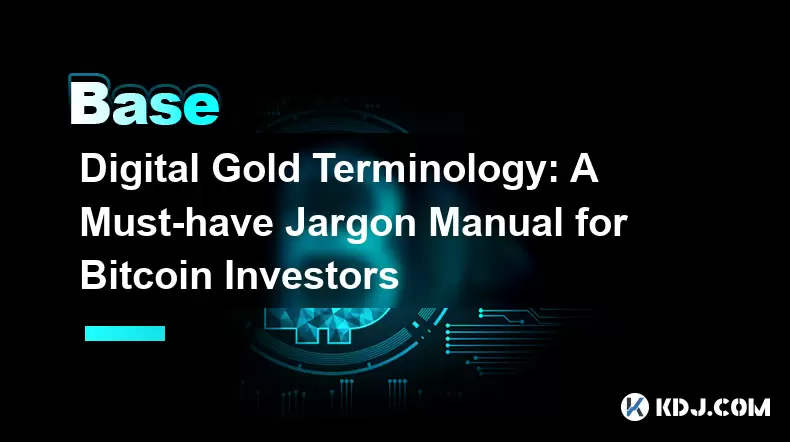
In the dynamic world of cryptocurrencies, Bitcoin has emerged as a leading digital asset, often referred to as digital gold. Understanding the specific terminology associated with Bitcoin is crucial for any investor looking to navigate this space effectively. This article serves as a comprehensive jargon manual, detailing essential terms that Bitcoin investors must know to enhance their investment strategies and decision-making processes.
Bitcoin Basics
At the core of the Bitcoin ecosystem is the term Bitcoin itself. Bitcoin is a decentralized digital currency, without a central bank or single administrator, that can be sent from user to user on the peer-to-peer bitcoin network without the need for intermediaries. Cryptocurrency refers to any digital or virtual currency that uses cryptography for security, with Bitcoin being the first and most well-known example.
Blockchain is another fundamental term, representing the underlying technology that enables Bitcoin transactions. It is a growing list of records, called blocks, that are linked using cryptography. Each block contains a cryptographic hash of the previous block, a timestamp, and transaction data. The blockchain is maintained by a network of computers, making it a distributed ledger.
Satoshi Nakamoto is the pseudonym used by the unknown person or group of people who developed Bitcoin. The term is significant as it represents the mysterious origins of the cryptocurrency and the foundational whitepaper that introduced Bitcoin to the world.
Bitcoin Transactions
When it comes to transactions, wallet is a critical term. A Bitcoin wallet is a software program where bitcoins are stored. It includes a public key, which is like an email address, and a private key, which is like a password. Public key and private key are essential for securing and accessing your Bitcoin.
Address refers to a unique identifier, similar to a bank account number, where Bitcoin can be sent. Each address is derived from the public key and is used to receive payments. Transaction is the act of transferring Bitcoin from one address to another, recorded on the blockchain.
Transaction fee is the amount paid to miners for processing and confirming a transaction on the Bitcoin network. Fees are typically determined by the size of the transaction in bytes, the urgency of the transaction, and network congestion.
Mining and Consensus
Mining is the process by which new bitcoins are created and transactions are verified and added to the blockchain. Miners use powerful computers to solve complex mathematical problems, and the first to solve the problem gets to add a block to the blockchain and is rewarded with newly minted bitcoins.
Proof of Work (PoW) is the consensus mechanism used by Bitcoin to validate transactions and add them to the blockchain. It requires miners to expend computational power to solve cryptographic puzzles, ensuring the security and integrity of the network.
Hash rate refers to the total computational power used to mine and process transactions on the Bitcoin network. It is measured in hashes per second and indicates the health and security of the network.
Block reward is the number of bitcoins awarded to miners for successfully adding a block to the blockchain. The block reward halves approximately every four years in an event known as halving, which is designed to control the supply of bitcoins and mimic the scarcity of gold.
Market and Investment Terms
Market capitalization (market cap) is the total value of all bitcoins in circulation, calculated by multiplying the current price of Bitcoin by the total number of bitcoins in circulation. It is a key indicator of Bitcoin's overall value and market position.
Volatility refers to the rapid and significant price changes that Bitcoin often experiences. Understanding volatility is crucial for managing investment risk and making informed trading decisions.
HODL is a term derived from a misspelling of "hold," used to describe the strategy of holding onto Bitcoin through market fluctuations, rather than selling during downturns. It reflects a long-term investment approach.
FOMO (Fear Of Missing Out) is a psychological phenomenon where investors buy Bitcoin out of fear of missing out on potential gains. It can lead to irrational decision-making and market bubbles.
Bear market and bull market describe the overall trend of the Bitcoin market. A bear market is characterized by falling prices and a negative outlook, while a bull market features rising prices and optimism.
Regulatory and Security Terms
KYC (Know Your Customer) and AML (Anti-Money Laundering) are regulatory requirements that cryptocurrency exchanges must follow to prevent fraud and illegal activities. KYC involves verifying the identity of clients, while AML focuses on monitoring and reporting suspicious activities.
Cold storage and hot storage refer to different methods of storing Bitcoin. Cold storage involves keeping private keys offline, away from internet-connected devices, providing higher security. Hot storage, on the other hand, involves keeping private keys online, offering easier access but higher vulnerability to hacking.
51% attack is a potential security threat where a single entity gains control of more than half of the network's mining power, allowing them to manipulate the blockchain. Understanding this risk is crucial for assessing the security of the Bitcoin network.
Double spending is the potential for a malicious actor to spend the same Bitcoin more than once. The Bitcoin protocol is designed to prevent this through the consensus mechanism and the blockchain's immutable nature.
Frequently Asked Questions
Q: What is the significance of the term 'Satoshi' in the Bitcoin ecosystem?
A: 'Satoshi' is the smallest unit of Bitcoin, named after its creator Satoshi Nakamoto. One Bitcoin equals 100 million Satoshis, allowing for microtransactions and greater divisibility of the currency.
Q: How does the halving event affect Bitcoin's value?
A: The halving event reduces the rate at which new bitcoins are created, increasing scarcity and potentially driving up the value if demand remains constant or grows. It is a key event that Bitcoin investors monitor closely.
Q: What is the role of a node in the Bitcoin network?
A: A node is a computer that connects to the Bitcoin network and helps maintain the blockchain by validating and relaying transactions. Nodes play a crucial role in the decentralized nature and security of the network.
Q: Why is the term 'decentralized' important in the context of Bitcoin?
A: Decentralization means that Bitcoin is not controlled by any single entity, such as a government or financial institution. This feature is fundamental to Bitcoin's ethos of financial freedom and resistance to censorship.
Disclaimer:info@kdj.com
The information provided is not trading advice. kdj.com does not assume any responsibility for any investments made based on the information provided in this article. Cryptocurrencies are highly volatile and it is highly recommended that you invest with caution after thorough research!
If you believe that the content used on this website infringes your copyright, please contact us immediately (info@kdj.com) and we will delete it promptly.
- CoinDCX, Coinbase, and Cyber Heists: A Crypto Rollercoaster
- 2025-08-02 14:30:12
- Solana, Axiom Exchange, and Revenue: Navigating the Future of DeFi
- 2025-08-02 12:50:12
- Metaplanet's Bitcoin Treasury Move: A Bold Bet or Risky Gamble?
- 2025-08-02 14:30:12
- Cardano (ADA) and Altcoin Gains: Navigating the Crypto Landscape
- 2025-08-02 12:55:11
- Bitcoin, MicroStrategy, and Crypto Taxonomy: Decoding the Future of Digital Assets
- 2025-08-02 14:50:11
- Bitcoin's Bearish Momentum: Fakeout or the Real Deal?
- 2025-08-02 12:30:12
Related knowledge
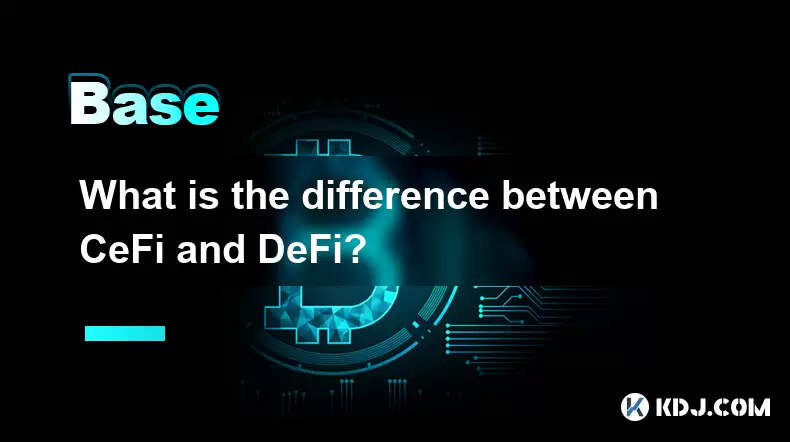
What is the difference between CeFi and DeFi?
Jul 22,2025 at 12:28am
Understanding CeFi and DeFiIn the world of cryptocurrency, CeFi (Centralized Finance) and DeFi (Decentralized Finance) represent two distinct financia...

How to qualify for potential crypto airdrops?
Jul 23,2025 at 06:49am
Understanding What Crypto Airdrops AreCrypto airdrops refer to the distribution of free tokens or coins to a large number of wallet addresses, often u...
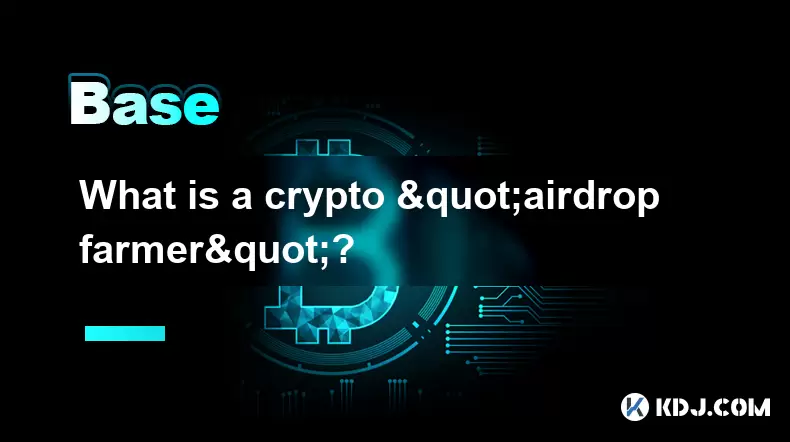
What is a crypto "airdrop farmer"?
Jul 24,2025 at 10:22pm
Understanding the Role of a Crypto 'Airdrop Farmer'A crypto 'airdrop farmer' refers to an individual who actively participates in cryptocurrency airdr...
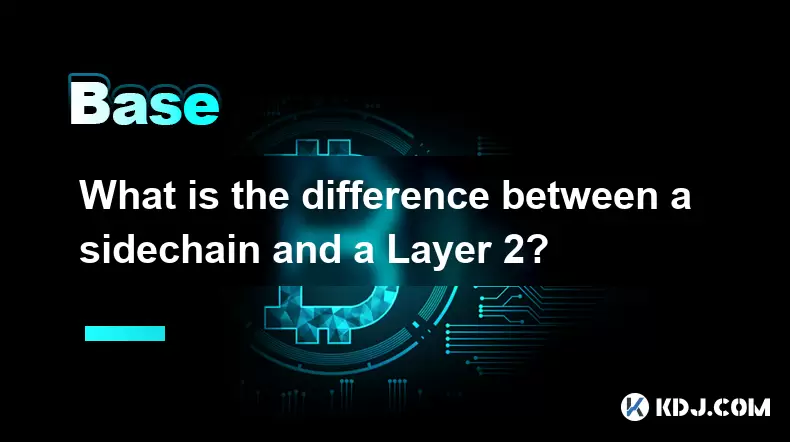
What is the difference between a sidechain and a Layer 2?
Jul 20,2025 at 11:35pm
Understanding the Concept of SidechainsA sidechain is a separate blockchain that runs parallel to the main blockchain, typically the mainnet of a cryp...
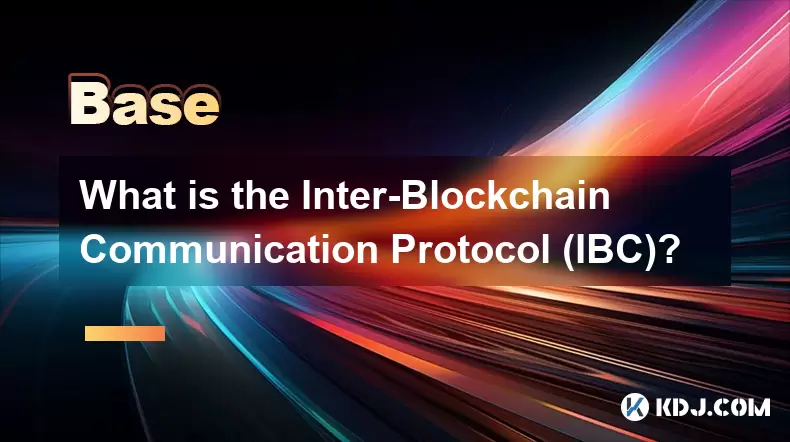
What is the Inter-Blockchain Communication Protocol (IBC)?
Jul 19,2025 at 10:43am
Understanding the Inter-Blockchain Communication Protocol (IBC)The Inter-Blockchain Communication Protocol (IBC) is a cross-chain communication protoc...
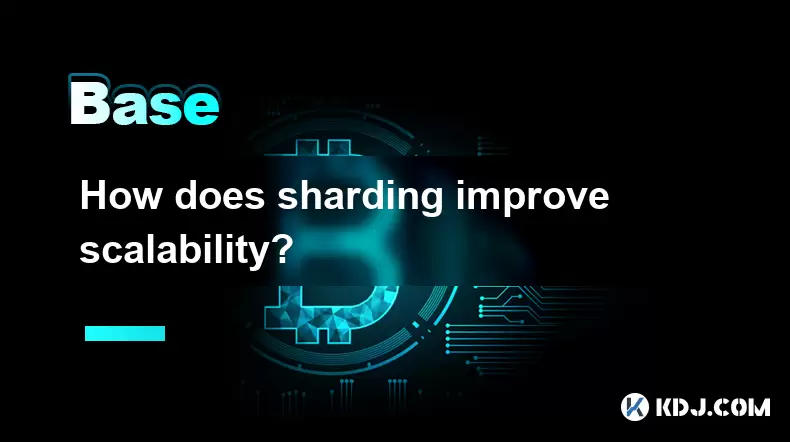
How does sharding improve scalability?
Jul 20,2025 at 01:21am
Understanding Sharding in BlockchainSharding is a database partitioning technique that is increasingly being adopted in blockchain technology to enhan...

What is the difference between CeFi and DeFi?
Jul 22,2025 at 12:28am
Understanding CeFi and DeFiIn the world of cryptocurrency, CeFi (Centralized Finance) and DeFi (Decentralized Finance) represent two distinct financia...

How to qualify for potential crypto airdrops?
Jul 23,2025 at 06:49am
Understanding What Crypto Airdrops AreCrypto airdrops refer to the distribution of free tokens or coins to a large number of wallet addresses, often u...

What is a crypto "airdrop farmer"?
Jul 24,2025 at 10:22pm
Understanding the Role of a Crypto 'Airdrop Farmer'A crypto 'airdrop farmer' refers to an individual who actively participates in cryptocurrency airdr...

What is the difference between a sidechain and a Layer 2?
Jul 20,2025 at 11:35pm
Understanding the Concept of SidechainsA sidechain is a separate blockchain that runs parallel to the main blockchain, typically the mainnet of a cryp...

What is the Inter-Blockchain Communication Protocol (IBC)?
Jul 19,2025 at 10:43am
Understanding the Inter-Blockchain Communication Protocol (IBC)The Inter-Blockchain Communication Protocol (IBC) is a cross-chain communication protoc...

How does sharding improve scalability?
Jul 20,2025 at 01:21am
Understanding Sharding in BlockchainSharding is a database partitioning technique that is increasingly being adopted in blockchain technology to enhan...
See all articles

























































































